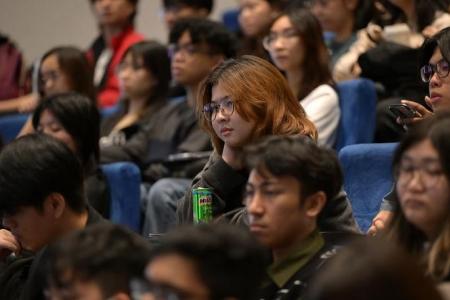Poly, ITE graduates from work-study courses earn more
More graduates from the polytechnics and Institute of Technical Education (ITE) will be able to pursue higher qualifications while working, with 10 new work-study courses being launched in 2024.
The five polytechnics will add these programmes in the growing digital, green and care sectors, expanding the range of training opportunities for students, said Second Minister for Education Maliki Osman on July 17.
Of the 10, three courses started classes in April, and the rest will begin in the second half of 2024.
Speaking at the annual SkillsFuture Work-Study Fair held at Republic Polytechnic, Dr Maliki said that work-study graduates have enjoyed good employment outcomes, with more than nine in 10 securing jobs within six months after completing the programmes.
Most students stayed at the companies that sponsored them for the programme.
“Many said that the programme equipped them with skills and competencies for larger or higher job roles, which were reflected in their salaries,” said Dr Maliki. On average, six months after finishing the programme, graduates earned 33 per cent more than before, he noted.
He also cited figures from a recent study on wage outcomes of polytechnic graduates in work-study courses from 2018 to 2021 by the Ministry of Trade and Industry, which showed they earned more during the programme than their peers who started working immediately.
Two years after completing the programme, graduates earned an average of 9 per cent more. In the next two years, they continued to earn 6 per cent more than those who had joined the workforce directly.
Said Dr Maliki: “This is a good indication that the market recognises the value of the work-study programmes.”
More than 13,000 students and 3,000 companies have joined work-study programmes since they were launched in 2015.
The scheme matches students to a job related to their course of study. They undergo a 12-month to 36-month training programme with employers and attend regular classes at the polytechnics or ITE.
At the end, graduates receive an industry-recognised diploma-level qualification.
The number of such programmes has grown, from 15 courses across 12 sectors in 2015 to about 170 courses covering 40 sectors at the diploma, post-diploma and degree levels today.
Dr Maliki said they “provide an alternative upskilling pathway to academic qualifications where the training is delivered by the institutions only”.
Such an apprenticeship model also involves the industry in curating and delivering the skills people need at the workplace, he added.
After completing a Western culinary arts Nitec qualification at ITE, Ms Koh Xiu Li decided to enrol in the work-study programme.
She worked at hospitality group Sofitel Singapore City Centre while returning to ITE once a week for classes. After 2½ years, she obtained a diploma in culinary arts and management.
The classes at ITE also exposed her to management-level skills such as inventory management and costing, which are vital to her goal of running her own business, said Ms Koh, who dreams of opening her own cafe specialising in Italian-fusion cuisine.
Another student, Mr Dheepan Nair, 27, is pursuing a work-study specialist diploma in supply chain management and will complete his studies in October.
The bulk of his time during the week is spent working at a third-party logistics company, Sims Solution, as a junior warehouse executive.
Every Wednesday, from 9am to 5pm, he attends classes at Republic Polytechnic.
His decision came after completing a diploma in business management in Nanyang Polytechnic and two years of national service.
He believes that having the higher certification would appeal more to employers, and also because he has gained job experience.
Although he feels the toll of his weekly schedule and has less time to himself, he says he likes the arrangement of working and studying.
“What I enjoy a lot is actually being able to apply what I learn in school and doing it in real life because at school we never see it coming to fruition if we’re just studying.”
Get The New Paper on your phone with the free TNP app. Download from the Apple App Store or Google Play Store now


